Forever : The Ballad of Artful Dodger
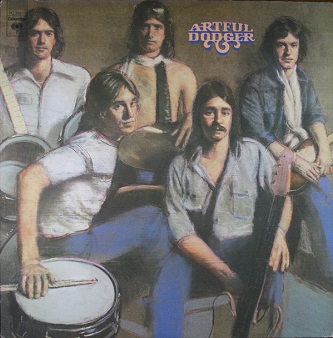
Story by Ed Turner; Guide by Peter Lindblad
(June 2017)
"Conceivably these kids could turn into teen heroes everybody can be proud of. A lot a bands around CBGB's will spend their lives wishing they could have gotten it together like this."1.
Robert Christgau, The Village Voice, October 1976
There's a lovely moment during a 1991 interview with Fairfax, VA power pop legends Artful Dodger, backstage at Cleveland, Ohio's Agora Ballroom.
Reunited for the first time in a decade, and clearly excited to be playing together again, Artful Dodger sit down with VidMag correspondent Agatha Szubski who, amid the band's customary hijinks, in-jokes and One-For-All, All-For-One camaraderie ("We'd like to defer this question to Steve Cooper - he's our mouthpiece") manages - more or less - to interview the band members. That is, when she can get their attention.
After a particularly riotous story involving an Artful Dodger recording session in Studio B at New York's legendary Record Plant studios, The Rolling Stones and a case of mistaken identity, Billy Paliselli , the band's lead singer and resident cut-up, takes a sudden left turn, telling Szubski, "These are my brothers; these are my closest friends. I can't imagine playing with anybody else..." He's serious, of course, and his words catch the others off-guard.
But if there was a time to say these things, perhaps this was it.
In truth, following that evening's show, the members of Artful Dodger would only manage to play together on three further occasions before the The-Greatest-Band-That-Almost-Made-It called it a day. This is their story.
II.
Originally, the band that would become Artful Dodger were five Fairfax, VA locals who got their start, like so many hopefuls, playing on the regional band scene. The year was 1972, and cousins Steve Cooper and Billy Paliselli were busy gigging in a Fairfax combo known as Badge, while Steve Brigida, Gary Cox and Gary Herrewig were marking time in another local outfit, Homestead.
Eventually, these five would manage to hook up and become - for a time, anyway - Brat. As sometimes happens, Brat discovered they were co-opting a name which was already taken by another band. On the suggestion of Herrewig's girlfriend, they abandoned the name Brat and rechristened themselves Artful Dodger. And with that, the classic lineup - Paliselli on vocals, Herrewig on lead guitar, Cox on rhythm guitar, Cooper on bass, and Brigida on drums - was born.
Even in the early, dues-paying stages of the band's career, holding rehearsals in the basement of the Paliselli family home, it was obvious they were onto something. To begin with, there was no question Artful Dodger had a dynamic front man in Billy Paliselli. With his rock-star-ready looks and Steve Mariott by-way-of Rod Stewart vocals, Paliselli had - in the parlance of the day - what it took.
Not that the other members of the band were any less commanding when it came to putting the music across. Reinforced by Gary Cox's propulsive rhythm guitar, Gary Herrewig's chiming, quicksilver leads never failed to hit their mark. And underpinning it all was the relentless, driving rhythm section of Steve Cooper and Steve Brigida, whose hand-in-glove interplay called to mind a Stateside Moon and Entwistle. Throw in a potent songwriting team in Paliselli and Herrewig, and all of the boxes were ticked.
Buoyed by an intense belief in the music - and each other - Artful Dodger spent their nights tearing up the local club circuit, attracting a rabid following in the process. From there, things began to move swiftly for the band.
By 1974, with a clutch of newly-recorded demos in hand, Gary Cox set off for New York City and the major labels. After cold-calling a number of management companies, Cox lucked up on Leber & Krebs (whose stable of hard rock giants included Aerosmith, Ted Nugent, AC/DC and The New York Dolls). As it turned out, Cox couldn't have landed on Leber & Krebs' doorstep at a better time. It took only one listen for David Krebs to offer the group a management deal.
III.
Labeled today as torchbearers of the musical genre that came to be known as power pop (a lineage whose roots can be traced to such '70's bands as Blue Ash, Raspberries, Badfinger, and Big Star, among others), Artful Dodger were that and more. For beneath the jangly pop sheen, an unusual musical alchemy was taking place among these five musicians - one that drew inspiration from the Small Faces in their All or Nothing -era prime, and the working class grit of the early Stones. Indeed, amid the fog of Progressive Rock that shrouded the airwaves during much of this period, the music of Artful Dodger was nothing less than a call-to-arms.
Exhibit A : Their eponymously titled 1975 debut album. Recorded for Columbia Records by ace producer Jack Douglas of Aerosmith fame, Artful Dodger remains an essential listen 42 years after its release.
Artful Dodger's calling card, "Think, Think " - one of three tracks from the album touted at the time for release as a possible breakthrough single, and the song that the album is probably best remembered for today - is just exquisite. Powered by an indelible opening riff, heart-stopping middle eight straight out of the Lennon/McCartney playbook and Paliselli's full throttle, high-octane vocals and cocksure attitude - "Start thinkin', baby! " - the band deliver a barnstorming fusion of hard rock and unbeatable, radio-friendly hooks. In the grand tradition of The Who, The Stones and The Beatles, this was the 45 single as a Statement of Purpose. As commanding, in its own way, as " Can't Explain," " Watcha Gonna Do About It,” "Til The End of The Day... well, take your pick. It's that good. Incredibly, the rest of the album maintains that standard. The opening trifecta alone - "Wayside,” "You Know It's Alright" and "It's Over" - is enough to induce power pop chills.
Notices in the press were uniformly ecstatic. From the pages of Circus magazine, Bud Scoppa rang the bell, announcing, " They know what they are doing and they do it right. To call this album a promising debut would be an understatement." Future USA Today arts and entertainment editor Ken Barnes: "Their debut LP features nothing but exciting, power-packed hard rock. with plenty of ringing guitars, fine singing, and melodic flair. Artful Dodger is one of the best of the new breed..." Joining the chorus, San Francisco's Bay Guardian reckoned, " This band is hot and it's going places... an immensely talented rock band."
Amid the profusion of Herrewig/ Paliselli originals, history will note, Gary Cox contributed the tender, lilting "Silver and Gold,” a McCartney-esque ballad which showcased, to great effect, Cox's own developing songwriting prowess.
Significantly, Columbia - in a head-scratching moment of miscalculation - jumped the gun and released "Silver and Gold" as the debut single, only to watch in dismay as it failed to storm the charts. While a fine song in its own right, " Silver and Gold " wasn't representative of the group's overall sound, functioning more as an Artful Dodger deep cut rather than a breakout hit. The repercussions of the label's decision proved disastrous for the band, who were left to themselves to pick up the pieces.
With their debut album released and barely pausing for breath, Artful Dodger hit the road, opening for the likes of Heart, REO Speedwagon, Lynyrd Skynyrd, Blue Oyster Cult and labelmate Ted Nugent. While these artists were all enjoying airplay - to some degree or other - at the time, Artful Dodger were left to warm up crowds without the radio support that would've brought people to their feet. Meanwhile, at Columbia Records, assessing responsibility for " Silver and Gold"'s failure to chart became something of a corporate shell game; eventually, the suited executives at the label decided the band was to blame.
Fast forward to 1976. Another album (Honor Among Thieves), another tour (this time, opening for KISS).
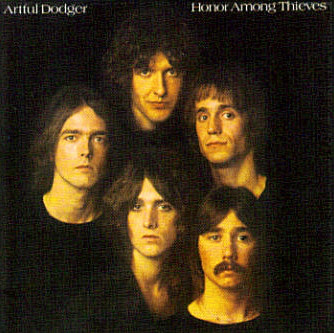
Unfortunately, Artful Dodger again found themselves plagued by a lack of support from Columbia (wary perhaps, and still smarting from the non-starter that was " Silver and Gold"), and the album never received the kind of promotional push that would've helped it catch fire on radio and in record stores. A problem Steve Siminec gamely tackled in Cleveland's Scene magazine, when he vaulted Artful Dodger to the ranks of "one of the best kept secrets in the business."
A combination of bad luck and ill-timed decision making extended to the tour as well. Although KISS and Artful Dodger got along famously offstage, as headliner and opener they were woefully mismatched. Ramped-up for the fire breathing antics and party-all-night anthems to come, audiences - often in Kabuki face paint themselves - were in no mood for Artful Dodger's no-frills stage presentation and deft pop rock. Night after night, the band found themselves - in a surreal twist - facing down an angry crowd of Space Aces, Catmans, Demons and Starchilds.
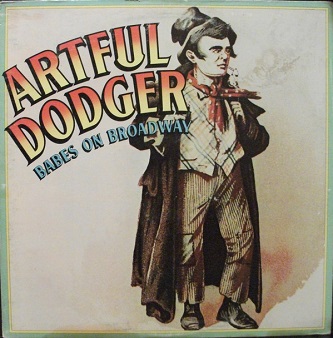
But once Cox's plan was underway, it played out to its inevitable conclusion as Aerosmith's Steven Tyler, Alice Cooper guitarist Dick Wagner, former Nugent frontman Derek St. Holmes, and go-to saxophonist of the day Michael Brecker (Billy Joel, Steely Dan, Eric Clapton, Dire Straits) trouped into the studio to make guest appearances on a number of tracks. Still, nothing really gelled as it should have. On paper, of course, the roll call of celebrity names looked great ; in the end, though, perhaps it was simply a case of too many cooks. Whatever the reasons, once the dust settled and the album was released, by the band's own standards Babes on Broadway was a lesser effort.
That being said, several tracks stand out as worthy of mention. Cox's " Can't Stop Pretending,” for one, convincingly recalls past glories without being a retread of what came before. "Who In The World ,” moreover - another Cox original - is a jaw-dropping evocation of The Bee Gees, circa "Gotta Get A Message to You." Avoiding pastiche, Artful Dodger nail the Carnaby Street whimsy of the Bee Gees' mid-'60s singles with uncanny accuracy.
Still, those powderkeg recording sessions had left an ugly stain. By the time Babes on Broadway was released, in October 1977, aside from a handful of club dates the album received no tour support to speak of. Tepid reviews from the music press only served to confirm everyone's worst fears. The comedown was hard, and Gary Cox became the band's first casualty. By November, he'd left Artful Dodger to pursue a solo career.
While Cox's departure wasn't necessarily a fatal blow to the band, at the same time, if there is a certain truth to the old adage about strength in numbers, navigating through the waning, wasted years of the '70's would prove difficult for the four who remained.
IV.
Following the loss of Gary Cox, an ill wind seemed to blow through the band's declining fortunes. Before the turn of the decade, Leber & Krebs would fall out of favor with Columbia Records, and in one broad stroke Artful Dodger would lose their management deal and their label. Arguably, this would have been reason enough to call time on the band. But that question will remain forever unanswered as, at the advent of the '80's, Clive Davis's Arista Records offered Artful Dodger a deal on their subsidiary label, Ariola. They jumped at the chance.
Aware that this next album was a make-it-or-break-it proposition - at least in marketplace terms - the band left little to chance, hammering out their finest batch of songs since the debut, and recruiting multi- instrumentalist Peter Bonta to take the place of the departed Cox. The result? 1980's Rave On, considered by many to be the pinnacle of Artful Dodger's recorded output. David McGee's review in Record World that year typified the kind of reaction the album was garnering from critics: "Rave On, the group's first Ariola album, marks their triumphant return... they also remember when rock was truly great, when every song on the radio was a gem, and they've succeeded in capturing that feeling in their music..." In the same issue , Rave On swept the week's' " Album Picks" (most recommended) and "Album Airplay" (most added) categories.
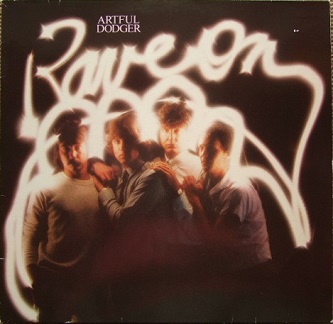
A shame then that Rave On flew under the radar, because it was - and remains - the band's masterpiece. Revisionist history may give the nod to the debut, but that would be wrong. Rave On was a career-defining - and era-defining - release, one that found a remarkable band at the absolute peak of their powers. And, sadly, the end of the line.
For an album whose songs seem loosely themed around concepts of loss and regret, given hindsight, it's difficult not to interpret tracks such as "Forever,” "So Afraid " and "Now or Nevermind" as the band's own commentary on their frustrating lack of commercial success. Indeed, the album title alone could be read as a defiant middle finger to the vagaries of the music business and its star-making machinery. As ever, though, and this being an Artful Dodger album, the music inside the cardboard sleeve was catchy enough to sugarcoat the bitterness of the lyrics. Still, the subtext of disillusionment - disillusionment with the music business and a fickle record-buying public - was plainly on offer for anyone who cared to listen.
Prior to Rave On, Paliselli's vocals seemed to jet-propel the band's songs. But something markedly different was afoot this time - most pointedly, perhaps, on Rave On's penultimate track, the heart-rending, " Forever." To Peter Bonta's lovely piano accompaniment, Billy Paliselli starkly addresses the band's "do or die" career dilemma. And if ever a song could be described as an open wound, this would be it:
It's now or neverBy song's end, Paliselli's voice is a whisper - plaintive, aching - and all the more powerful for it. A long way from the youthful optimism of "Think, Think,” but maybe that was the point. Hard-won wisdom never comes without a price, and this one would prove particularly costly. Within the year, Artful Dodger would break up.
Is that what you're saying?
Get on home, boy
Put your dreams away
This ain't no dream I talk about
This here is something I can't live without
V.
On August 16, 2012, Cleveland's classic rock station, 98.5 WNCX, announced the passing of Gary Cox. It was reported on their website that Cox had succumbed to a brain tumor. " Gary leaves behind a wife and 13 year old daughter who probably never fully realized how much the Cleveland fans loved Artful Dodger, " the station noted, in a fitting tribute to the guitarist and the band he helped found.
After hanging up his stage clothes in the early '80's, Billy Paliselli owned and operated American Road Motorcycles, in Amissville, VA, before relocating to Florida, where he still lives today. Steve Cooper and Steve Brigida, when day jobs and schedules allow, still play together on occasion as the appropriately titled, Band of Steves. Cooper also finds time to record with The Rectifiers, an offshoot of the Christian-based motorcycle ministry he rides with. Peter Bonta's last known whereabouts? Pistoia, Italy, where, according to his LinkedIn profile, Bonta is " Back doing what I know and love best, music! " And Gary Herrewig? In 1985, Herrewig self-released an EP, 4-Gone Conclusions, which has since become a highly sought after treasure among fans of power pop. One of the highlights of the EP is Herrewig's re-recording of a long lost Artful Dodger demo, " Hurt You Too."
On January 13th of this year, Real Gone Music released a lovingly assembled repackaging of the band's three Columbia albums, entitled (natch) Artful Dodger: The Complete Columbia Recordings. It may come as a surprise to some that a market still exists for for a band whose last album was released in 1980, 37 years ago now. For the faithful, though, this release was long overdue.
Most enduring of all, perhaps, is the existing concert footage of the band, circa their '70's/'80's residency at The Agora Ballroom, available on the Internet for a new generation of fans to discover. Through the timeworn frames of film, this is as close as they will ever get to what the fuss was all about. Watching, and wondering, one suspects, whatever happened to the band. Or didn't happen to the band. What might have been...
As for final words, well, that's easy enough. Picking up where we left off backstage at the Agora, in 1991, as Agatha Szubski asks Artful Dodger one last question before the show. " Any future plans you're willing to share with us?"
Billy Paliselli: "Nothing that could come out of this - that could potentially come out of this - could possibly surprise me. Because it's been such an absolutely wonderful time..."
Rave on.
Special thanks to Steve Cooper, Artful Dodger bassist and band archivist, for his valuable assistance and encouragement.
Ed Turner is the Executive Producer of the documentary, Ticket to Write : The Golden Age of Rock Music Journalism.
Artful Dodger Buyer's Guide
By Peter Lindblad
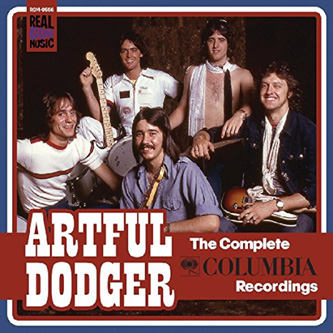
Artful Dodger never really had its day in the sun, but a recent compilation, The Complete Columbia Recordings, has rekindled interest in the power-pop cult favorites. Here's what the world's been missing:
Artful Dodger (Columbia Records PC 33811) – The band's self-titled 1975 debut is brimming with tight, cocksure hooks, soulful yearning and pristine melodies. Produced by Jack Douglas of Aerosmith fame, it mixes Beatlesque pop charm with gritty, blue-collar hard rock. "Wayside" is a classic anthem, bright and exuberant with a sugary crunch that also candies "Follow Me" and "You Know It's Alright," while the bittersweet "Silver and Gold" just melts in your ears.
Honor Among Thieves (Columbia Records PC 34273) – A worthy successor, their second album arrived a year later, with Artful Dodger sounding a little tougher on a rowdy title track, "Keep Me Happy" and "Not Enough," even as the deep, torn-and-frayed power ballad "Scream" swooned and "Dandelion" exuded summery languor.
Babes on Broadway (Columbia Records PC 34846) – While struggling with the weight of unmet expectations, a splintering Artful Dodger was also growing more ambitious and experimental. Increasingly refined pop sensibilities emerged in songs like "Alright," as some of their bold assertiveness was lost. For every sunny, upbeat winner like "Can't Stop Pretending" – horns and all – there was a limp, lethargic ballad such as "Mistake" or a weird, if energetic, outlier like "Idi Amin Stomp."
Rave On (Ariola America Records OL 1503) – A fitting last hurrah, this final album saw Artful Dodger recapture the magic with the most polished, accessible effort of their career. Always adept at simply elegant song construction, Artful Dodger sounds as focused and confident as ever on engaging, memorable gems such as "She's Just My Baby," "A Girl (La La La)," "Get in Line" and "Now or Never Mind."
Want more? Check out www.arrtfuldodgersite.com, a website where fans trade stories and
share memories of the band (3,385 registered members and counting). As well - though not particularly
surprising in this day and age of social media - Artful Dodger now have their own Facebook page.